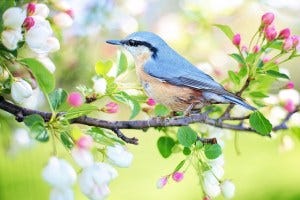I was out walking my little dog, Nikki, and we both enjoyed a bright, sunny morning with perfect temperatures. The trees were sprouting leaves, and birds were heard chirping nearby. The morning reminded me of a poem I had just read last night entitled "The Summer Day" by the late poet laureate Mary Oliver. I hope you find this as inspiring as I do:
Poem 133: The Summer Day, by Mary Oliver.
"Who made the world?
Who made the swan, and the black bear?
Who made the grasshopper?
This grasshopper, I mean—
the one who has flung herself out of the grass,
the one who is eating sugar out of my hand,
who is moving her jaws back and forth instead of up and down—
who is gazing around with her enormous and complicated eyes.
Now she lifts her pale forearms and thoroughly washes her face.
Now she snaps her wings open, and floats away.
I don't know exactly what a prayer is.
I do know how to pay attention, how to fall down
into the grass, how to kneel down in the grass,
how to be idle and blessed, how to stroll through the fields,
which is what I have been doing all day.
Tell me, what else should I have done?
Doesn't everything die at last, and too soon?
Tell me, what is it you plan to do
with your one wild and precious life?"
—Mary Oliver:
The following is my interpretation of the meaning of the poem:
The poem "The Summer Day" by Mary Oliver is a sensitive and pleasing piece that explores the themes of the beauty of nature and the significance of human life. She describes her observation of a grasshopper, capturing its actions in vivid detail. This close examination of a small, often overlooked creature serves as a metaphor for paying attention to the little things in life that are typically ignored.
As the poem progresses, Oliver poses a rhetorical question that encourages readers to consider their role and purpose in the world. The line "Tell me, what is it you plan to do with your one wild and precious life?" is impactful, urging a contemplation of life’s brevity and the importance of living it purposefully and fully.
Ultimately, "The Summer Day" is a call to mindfulness and awareness, urging readers to observe the world around them with wonder and to consider their lives with thoughtful intention. Oliver's use of simple yet profound language and imagery invites us to find depth and meaning in everyday experiences. The poem resonates with those who seek to appreciate life's fleeting moments and ponder their personal journey in the natural world.
The poem is reflective and beautifully captures the essence of nature, the art of observation, and the contemplation of life. It raises poignant questions and vivid imagery, which invite readers to consider their own lives in relation to the natural world.
I believe the most significant line in the poem is, "Tell me, what is it you plan to do with your one wild and precious life?" serves as a philosophical inquiry into existence. This question is posed after a series of observations that link the personal to the universal. Mary Oliver reflects on prayer, wandering through fields, kneeling in the grass, and finally, the act of paying attention. It is through these acts that the narrator finds a deep connection to life's richness and complexity.
The poem concludes with a call to action, urging the reader to consider how they engage with their own life. Oliver does not merely describe her surroundings; she also challenges the reader to reflect on their purpose and choices. This is not done in a prescriptive manner but through prompting introspection about how one lives in relation to the time they have.
What is your interpretation of this poem? What aspect of this piece of literature is most meaningful to you?
Please submit your comments and observations.








This is a timely read for me 🦗